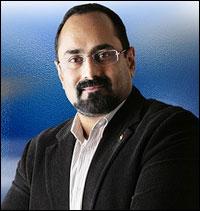 | « Back to article | Print this article |
At the 66th session of the United Nations, India made a proposal to control the Internet through a United Nations Committee.
The government of India proposed control over the Internet through the formation of CIRP {Agenda Item 16: Information and Communications Technologies for Development (ICT): Global Internet Governance}.
 This proposal is expected to come up for a discussion on May 18, 2012 in Geneva during the World Summit on the Information Society (WSIS) meeting on the issue of enhanced cooperation etc.
This proposal is expected to come up for a discussion on May 18, 2012 in Geneva during the World Summit on the Information Society (WSIS) meeting on the issue of enhanced cooperation etc.
Member of Parliament, Rajeev Chandrasekhar however has a lot of reservations over this proposal which according to him affects censorship of the Internet and also curbs Internet users.
The Member of Parliament from Karnataka has even written to the Prime Minister opposing the same. In this chat with rediff.com Chadrasekhar speaks about this proposal and also terms it as dangerous and ill-considered.
It affects 800 million Indian mobile users, hurts India's cause of freedom of expression and free speech and India's image as a vibrant democracy.
This policy is against the open, democratic, inclusive and unhindered growth of the internet. It harms India's reputation, has been submitted without a prior public consultation with multi-stakeholder groups, and therefore needs to be withdrawn.
India's position (in the statement), even though cleverly worded, hurts its reputation of a multi-ethnic, multi-cultural and democratic society with an open economy and an abiding culture of pluralism.
Further, it hurts the advancement of the internet as a vehicle for openness, democracy, freedom of expression, human rights, diversity, inclusiveness, creativity, free and unhindered access to information and knowledge, global connectivity, innovation and socio-economic growth.
It is fundamentally against the interest of 800 million mobile users and over 100 million Internet users in India who need to play a continued role by strengthening the existing multi-stakeholder process, rather than moving Internet governance to a government-run, inter-governmental, bureaucratically organised system - as proposed by India.